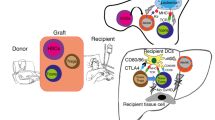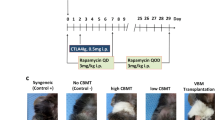Abstract
Donor-specific tolerance induced by bone marrow transplantation (BMT) would allow organ allografting without chronic immunosuppressive therapy. However, the toxicity1 of conditioning regimens used to achieve marrow engraftment has precluded the clinical use of BMT for tolerance induction. We have developed a BMT strategy that achieves alloengraftment without toxic or myelosuppressive host conditioning. B6 mice received depleting anti-CD4 and anti-CD8 monoclonal antibodies, local thymic irradiation, and a high-dose (174 × 106) of major histocompatibility (MHC)-mismatched B10.A bone marrow cells (BMCs) divided over days 0 through 4. High levels of donor cells were observed among white blood cells (WBCs) of all lineages. Permanent, multilineage mixed chimerism; donor-specific skin-graft tolerance; and in vitro tolerance were observed in most animals. Large numbers of donor class IIhigh cells were detected in thymuses of long-term chimeras, and their presence was associated with intrathymic deletion of donor-reactive host thymocytes. The treatment was not associated with significant myelosuppression, toxicity, or graft-versus-host disease (GVHD). Thus, high levels of allogeneic stem-cell engraftment can be achieved without myelosuppressive host conditioning. As stem-cell mobilization2 and in vitro culture techniques3 have increased the feasibility of administering high doses of hematopoietic cells to humans, this approach brings hematopoietic cell transplantation closer to clinical use for the induction of central deletional T-cell tolerance.
This is a preview of subscription content, access via your institution
Access options
Subscribe to this journal
Receive 12 print issues and online access
$209.00 per year
only $17.42 per issue
Buy this article
- Purchase on Springer Link
- Instant access to full article PDF
Prices may be subject to local taxes which are calculated during checkout
Similar content being viewed by others
References
Freirich, E.J., Gehan, E.A., Rall, D.P., Schmidt, L.H. & Skipper, H.E. Quantitative comparison of toxicity of anti-cancer agents in mouse, rat, hamster, dog, monkey, and man. Cancer Chemother. Rep. 50, 219 (1966).
Aversa, F. et al. Successful engraftment of T-cell-depleted haploidentical “three-loci” incompatible transplants in leukemia patients by addition of recombinant human granulocyte colony-stimulating factor-mobilized peripheral blood progenitor cells to bone marrow inoculum. Blood 84, 3948–3955 (1994).
Emerson, S.G. Ex vivo expansion of hematopoietic precursors, progenitors, and stem cells: The next generation of cellular therapeutics. Blood 87, 3082–3088 (1996).
Stewart, F.M., Crittenden, R.B., Lowry, P.A., Pearson-White, S. & Quesenberry, P.J. Long-term engraftment of normal and post-5-fluorouracil murine marrow into normal nonmyeloablated mice. Blood 81, 2566–2571 (1993).
Lee, L.A., Sergio, J.J. & Sykes, M. Natural killer cells weakly resist engraftment of allogeneic long-term multilineage-repopulating hematopoietic stem cells. Transplantation 61, 125–132 (1996).
Hayashi, H., Leguern C. Sachs, D.H. & Sykes, M. Alloresistance to K locus mismatched bone marrow engraftment is mediated entirely by CD4+ and CD8+ T cells. Bone Marrow Transplant. 18, 285–292 (1996).
Tomita, Y., Sachs, D.H., Khan, A. & Sykes, M. Additional mAb injections can replace thymic irradiation to allow induction of mixed chimerism and tolerance in mice receiving bone marrow transplantation after conditioning with anti-T cell mAbs and 3Gy whole body irradiation. Transplantation 61, 469–477 (1996).
Shizuru, J.A., Jerabek, L., Edwards, C.T. & Weissman, I.L. Transplantation of purified hematopoietic stem cells: Requirements for overcoming the barriers of allogeneic engraftment. Biol. Blood Marrow Transplant. 2, 3–14 (1996).
Martin, P.J. Donor CD8 cells prevent allogeneic marrow graft rejection in mice: Potential implications for marrow transplantation in humans. J. Exp. Med. 178, 703–712 (1993).
Kaufman, C.L. et al. Phenotypic characterization of a novel bone marrow-derived cell that facilitates engraftment of allogeneic bone marrow stem cells. Blood 84, 2436–2446 (1994).
Tomita, Y., Khan, A. & Sykes, M. Mechanism by which additional monoclonal antibody injections overcome the requirement for thymic irradiation to achieve mixed chimerism in mice receiving bone marrow transplantation after conditioning with anti-T cell mAbs and 3 Gy whole body irradiation. Transplantation 61, 477–485 (1996).
Tomita, Y., Khan, A. & Sykes, M. Role of intrathymic clonal deletion and peripheral anergy in transplantation tolerance induced by bone marrow transplantation in mice conditioned with a non-myeloablative regimen. J. Immunol. 153, 1087–1098 (1994).
Acha-Orbea, H. & Palmer, E. MIs — a retrovirus exploits the immune system. Immunol. Today 12, 356–361 (1991).
Tomonari, K. & Fairchild, S. The genetic basis of negative selection of TCRβ-V11 + T cells. Immunogenetics 33, 157–162 (1991).
Dyson, P.J., Knight, A.M., Fairchild, S., Simpson, E. & Tomonari, K. Genes encoding ligands for deletion of Vβ11 T cells cosegregate with mammary tumour virus genomes. Nature 349, 531–532 (1991).
Bill, J., Kanagawa, O., Woodland, D. & Palmer, E. The MHC molecule I–E is necessary but not sufficient for the clonal deletion of Vβ11 bearing T cells. J. Exp. Med. 169, 1405 (1989).
Anasetti, C. et al. Effect of HLA compatibility on engraftment of bone marrow transplants in patients with leukemia or lymphoma. N. Engl. J. Med. 320, 197–204 (1989).
O'Reilly, R.J. et al. Transplantation of marrow depleted of T cells by soybean lectin agglutination and E-rosette depletion: Major histocompatibility complex-related graft resistance in leukemic transplant recipients. Transplant. Proc. 17, 455 (1985).
Bachar-Lustig, E., Rachamim, N., Li, H.-W., Lan, F. & Reisner, Y. Megadose of T cell-depleted bone marrow overcomes MHC barriers in sublethally irradiated mice. Nature Med. 1, 1268–1273 (1995).
Sykes, M., Romick, M.L., Hoyles, K.A. & Sachs, D.H. In vivo administration of interleukin 2 plus T cell-depleted syngeneic marrow prevents graft-versus-host disease mortality and permits alloengraftment. J. Exp. Med. 171, 645–658 (1990).
Dialynas, D.P. et al. Characterization of murine T-cell surface molecule, designated L3T4, identified by monoclonal antibody GK1.5: Similarity of L3T4 to human Leu3/T4 molecule. J. Immunol. 131, 2445–2451 (1983).
Sarmiento, M., Glasebrook, A.L. & Fitch, F.W. IgG or IgM monoclonal antibodies reactive with different determinants on the molecular complex bearing Lyt2 antigen block T cell-mediated cytolysis in the absence of complement. J. Immunol. 125, 2665 (1980).
Sharabi, Y. & Sachs, D.H. Mixed chimerism and permanent specific transplantation tolerance induced by a non-lethal preparative regimen. J. Exp. Med. 169, 493–502 (1989).
Unkeless, J.C. Characterization of a monoclonal antibody directed against mouse macrophage and lymphocyte Fc receptors. J. Exp. Med. 150, 580–596 (1979).
Ozato, K., Mayer, N.M. & Sachs, D.H. Monoclonal antibodies to mouse major histocompatibility complex antigens. IV. A series of hybridoma clones producing antinH–2d antibodies and an examination of expression of H–2d antigens on the surface of these cells. Transplantation 34, 113–120 (1982).
Sherman, L.A. & Randolph, C.P. Monoclonal anti-H–2Kb antibodies detect serological differences between H–2Kb mutants. Immunogenetics 12, 183–189 (1981).
Scollay, R., Jacobs, S., Jerabek, L., Butcher, E. & Weissman, I. T cell maturation: Thymocyte and thymus migrant subpopulations defined with monoclonal antibody ies to MHC region antigens. J. Immunol. 124, 2845 (1980).
Sykes, M., Eisenthal, A., Sachs, D.H. Mechanism of protection from graft-vs-host disease in murine mixed allogeneic chimeras. I. Development of a null cell population suppressive of cell-mediated lympholysis responses and derived from the syngeneic bone marrow component. J. Immunol. 140, 2903–2911 (1988).
Watanabe, M., Suzuki, T., Taniguchi, M. & Shinohara, N. Monoclonal anti-lamurine alloantibodies crossreactive with the la-homologues of other mammalian species including humans. Transplantation 36, 712–718 (1983).
Ozato, K. & Sachs, D.H. Monoclonal antibodies to mouse MHC antigens. III. Hybridoma antibodies reacting to antigens of the H–2b haplotype reveal genetic control of isotype expression. J. Immunol. 126, 317–321 (1981).
Author information
Authors and Affiliations
Rights and permissions
About this article
Cite this article
Sykes, M., Szot, G., Swenson, K. et al. Induction of high levels of allogeneic hematopoietic reconstitution and donor-specific tolerance without myelosuppressive conditioning. Nat Med 3, 783–787 (1997). https://doi.org/10.1038/nm0797-783
Received:
Accepted:
Issue Date:
DOI: https://doi.org/10.1038/nm0797-783



